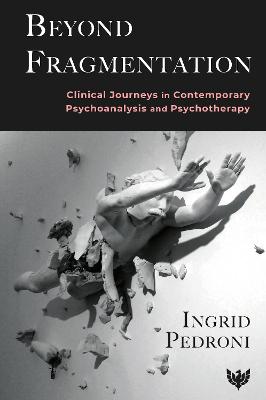Beyond Fragmentation: Clinical Journeys in Contemporary Psychoanalysis and Psychotherapy

Book Details
- Publisher : Karnac Books
- Published : 2023
- Cover : Paperback
- Pages : 304
- Category :
Psychoanalysis - Category 2 :
Individual Psychotherapy - Catalogue No : 96691
- ISBN 13 : 9781800131163
- ISBN 10 : 9781800131
Reviews and Endorsements
This is an important and most welcome book because it develops not only innovative ways of conceptualising and working therapeutically in general, but also it demonstrates how the approach that it constructs can be applied to contexts beyond the conventional psychotherapy settings, including areas such as traumas of wars and migration. Using epistemological insights, in an accessible language, the author builds bridges across theoretical directions, linking theory to practice (with ample clinical material, respectfully presented), the intra-psychic with the inter-relational realms and the traditional therapies with cultural and religious beliefs. Above all, the book is written with sensitivity and compassion for both patients and therapists, and it will be invaluable not only for professional therapists and trainees but also for everyone who wishes to delve deeper into the human psyche in distress.
Professor Renos K. Papadopoulos, PhD, University of Essex, clinical psychologist, Jungian psychoanalyst, family therapist
It is my pleasure to write in support of Ingrid Pedroni’s outstanding publication, Beyond Fragmentation: Clinical Journeys in Contemporary Psychoanalysis and Psychotherapy. It is a book that addresses the most important issues in clinical work from past to present, and, most significantly, leads us into a future of integration and dedication to the best in our field. As noted in the title of her Introduction, “Widening clinical practice in relation to other therapeutic schools as the future of psychoanalysis”, Pedroni begins with her own valuing of knowing the past and noting its movement into the present and what is to come. To provide some sense of the scope of the work, Pedroni follows with sections on: building therapeutic bridges, the search for subjectivity, working with couples, parents, families, transcultural psychotherapy, and, finally, the treatment of trauma in individuals and groups suffering migration and war. Throughout there are elegant clinical examples. I find much that is original here, but I’m most impressed by Pedroni’s chapter on Talking with God, in which she discusses “spirituality and religion in the therapeutic encounter”. This seldom-addressed aspect of therapeutic work illustrates, to my mind, the expansiveness of Pedroni’s inclusive attention to contemporary psychoanalysis and psychotherapy. I’m grateful for this opportunity to reflect on Ingrid Pedroni’s contribution to our understanding.
Estelle Shane, PhD, training and supervising analyst, The Institute of Contemporary Psychoanalysis and the New Center for Psychoanalysis, Los Angeles
Beyond Fragmentation is a true tour de force – a must-read for psychoanalytic clinicians and thinkers of all persuasions. Ingrid Pedroni has produced an amazingly comprehensive body of work that mirrors its author’s own developmental journey both personally and theoretically. Her book threads its way through the retrospective and the prospective and their intersections as she traverses and assimilates psychoanalytic theories, pressing cultural concerns and trauma from the individual to the collective. Her numerous and compelling clinical illustrations that are woven throughout cannot but stir the reader’s mind and heart. The book highlights her deep wisdom and humility as she models an attitude of openness and an abiding readiness to keep learning from students and patients, from colleagues and teachers, and from ongoing life lessons that instruct and humble us, even as they urge us to keep moving, to keep thinking and above all to keep feeling. Ingrid Pedroni’s Beyond Fragmentation will inspire, vitalise and richly inform the work of all clinicians and psychoanalytic thinkers.
Hazel Ipp, Toronto Institute of Contemporary Psychoanalysis, ISIPSÉ, chief editor emerita of ‘Psychoanalytic Dialogues’
Beyond Fragmentation is a remarkable achievement. The use of diverse clinical experiences at its finest. Ingrid Pedroni integrates self psychology and relational psychoanalysis and makes comparisons among therapy schools that are lucid and, at times, magisterial. She captures the radical changes that are taking place in psychoanalytic epistemology, the search for “the creation of oneself”, culture and religion, and the dangers of either/or thinking about gender. She brings us close to the subtle, interpenetrating impact of couples, parents, and families on the individual self. Her thinking about how culture saturates one’s subjectivity is bold and inspiring, and ranges from individual to collective traumas. Pedroni’s writing resonates with the tensions and triumphs of the contemporary psychoanalytic moment, and likely will for another generation, if not beyond.
Spyros D. Orfanos, PhD, ABPP, Director and Clinical Professor, New York University Postdoctoral Program for Psychotherapy and Psychoanalysis
Profoundly honest, unflinching in examining her own history as a thinker and clinician, Ingrid Pedroni challenges us to see where we have been and where we have failed, each of us.
Donna M. Orange, faculty and supervising analyst, Institute for the Psychoanalytic Study of Subjectivity, New York, from the Foreword
This book is an impressive philosophical and historical explication of psychological theory beginning with Freud through to the modern day. In particular, Pedroni's use of Kohut's model has changed my own originally sceptical response to his theory of self psychology. [...] Pedroni's clinical examples are clear and moving. [...] An inspiring read, the theme of integration of other models gives hope for the future of psychoanalysis.
Gillian Ingram, MBACP (Accred), psychodynamic therapist, BACP Therapy Today, 35:2, March, 2024

